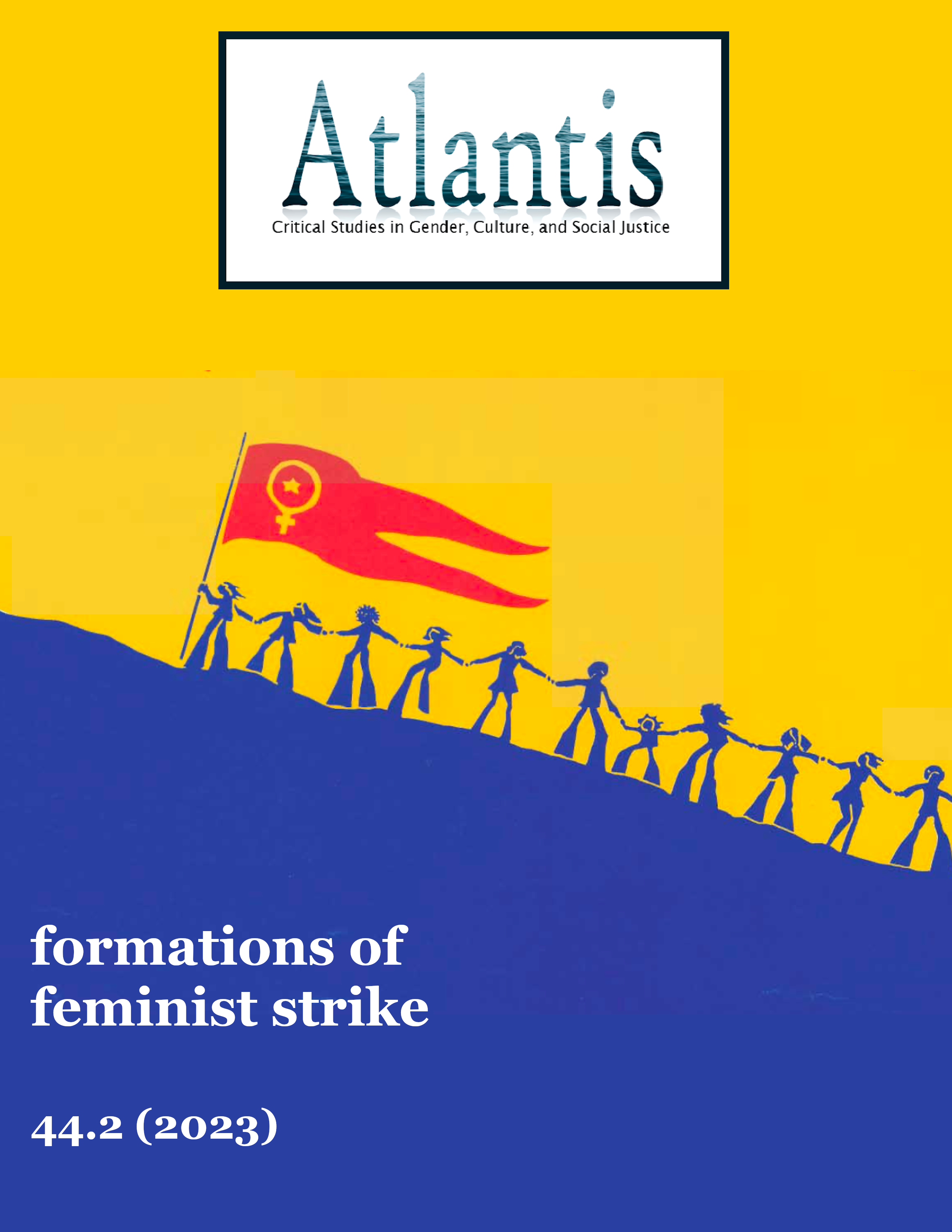La grève féministe: Libéria
Mots-clés :
Féminisme africain, Libéria, résistance, grève du sexe, violence sexuelle, guerreRésumé
L’article examine la notion de grève féministe en faisant allusion à des femmes pacificatrices au Libéria. Il soutient que les actions de ces femmes pour mettre fin à la guerre ont à la fois instancié des notions normatives de la grève féministe et les ont approfondies. En puisant dans la littérature, qui pointe vers une longue histoire de femmes libériennes qui s’organisent en fonction de la particularité de leurs rôles et responsabilités dans la société, on nous invite dans cet article à adopter une compréhension élargie de la grève féministe. Il est également suggéré que la mobilisation des femmes autour du concept d’une grève du sexe pour mettre fin à la guerre au début des années 2000 constituait un geste puissant et astucieux, qui dénonçait la violence sexuelle en temps de guerre, tirait profit de l’attention de la communauté internationale et mettait également en évidence, au moins de façon implicite, la question des droits sexuels dans un mariage.
Références
Campillo, Inés Campillo. 2019. “If we stop, the world stops”: the 2018 feminist strike in Spain, Social Movement Studies, 18:2, 252-258, DOI: 10.1080/14742837.2018.1556092
Diabate, Naminata. 2020. Naked Agency: genital cursing and biopolitics in Africa. Duke University Press,
Ebila, Florence, and Aili Mari Tripp. 2020. "Naked transgressions: gendered symbolism in Ugandan land protests." In Body Politics, eds Brown, Nadia, and Sarah Allen. Routledge: pp. 25-45
Fuest, Veronika. 2009. “Liberia’s Women Acting For Peace: Collective Action In A War-Affected Country." In Stephen Ellis, and Ineke Van Kessel, eds. Movers and shakers: Social movements in Africa. Vol. 8. Brill, 2009: pp. 114-137.
Gago, Verónica, and Raquel Gutiérrez Aguilar. 2020. "The Feminist Strike as Threshold" New Global Studies 14, no. 2: 111-120. https://doi.org/10.1515/ngs-2020-0012
Gbowee, Leymah, with Carol Mithers. 2011. Mighty Be Our Powers : How Sisterhood, Prayer, and Sex Changed a Nation at War: A Memoir. London: Beast Books.
Moran, Mary H. 1989. "Collective action and the ‘representation’ of African women: A Liberian case study." Feminist Studies 15, no. 3: 443-460
Moran, Mary. 2012. “Our Mothers have Spoken: Synthesizing Old and New Forms of Women’s Political Authority in Liberia,” Journal of International Women’s Studies, 13, 4: 51-66, p. 60.
Scully, Pamela. 2016. Ellen Johnson Sirleaf (Short Histories of Africa, Ohio University Press, 2016) and in African Leaders of the Twentieth Century, Volume 2 (Athens: Ohio University Press, 2022)
Van Allen, Judith. 1972. "‘Sitting on a man’: colonialism and the lost political institutions of Igbo women." Canadian Journal of African Studies/La Revue canadienne des études africaines 6, no. 2: 165-181.
Van Allen, Judith. 2007. Feminism and Social Democracy in Botswana, Socialism and Democracy, 21:3: 97-124, DOI: 10.1080/08854300701599825
Whetstone, Crystal Marie. 2013. "Is the Motherist Approach More Helpful in Obtaining Women's Rights than a Feminist Approach? A Comparative Study of Lebanon and Liberia." PhD diss., Wright State University.
Téléchargements
Publié
Numéro
Rubrique
Licence
© Pamela Scully 2023

Cette œuvre est sous licence Creative Commons Attribution 4.0 International.
Les auteurs qui publient dans cette revue acceptent les conditions suivantes:
1. Les auteurs conservent les droits d’auteur et accordent le droit de première publication à la revue. L’œuvre est simultanément sous licence internationale Creative Commons Attribution 4.0 qui permet à d’autres personnes de la partager en citant dans les remerciements l’auteur de l’œuvre et sa publication initiale dans cette revue.
2. Les auteurs savent que les articles publiés dans Atlantis sont indexés et disponibles par le biais de divers outils de recherche universitaires et professionnels, y compris, entre autres, Erudit.
3. Les auteurs peuvent conclure des ententes contractuelles supplémentaires et distinctes pour la distribution non exclusive de la version de l’article publiée par la revue (c’est-à-dire, l’afficher dans un dépôt institutionnel ou la publier dans un livre), en signalant qu’elle a été initialement publiée dans cette revue.
4. Les auteurs sont autorisés et encouragés à prépublier leur œuvre, c’est-à-dire à la publier en ligne (dans un dépôt institutionnel ou sur leur site Web, par exemple) avant et pendant le processus de soumission. Cela peut conduire à des échanges productifs, ainsi qu’à ce que le travail publié soit cité plus tôt et plus souvent. Renseignez-vous davantage ici sur la prépublication.







